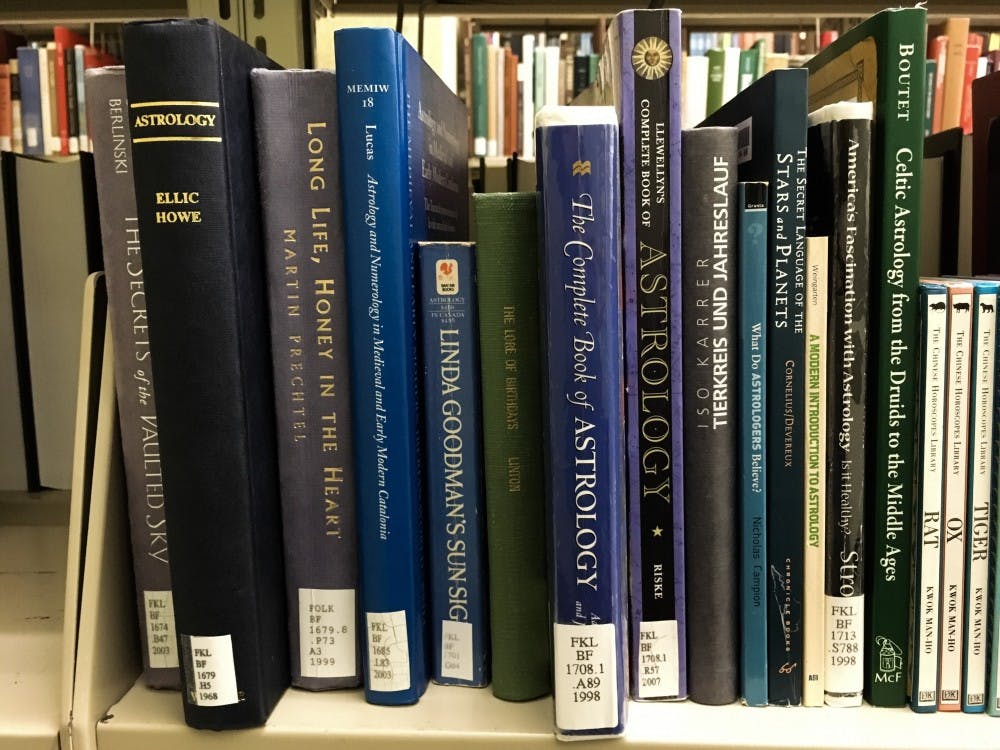I was in the Wells stacks last semester researching witch trials when the next shelving unit over caught my eye. Right next to serious historical surveys of witch hunts were dozens of books on ancient astrology and the Hermetic Order of the Golden Dawn.
It turns out our very own Herman B Wells Library has a hearty collection of astrology texts. This includes astrology as studied by historians and folklorists, and practical texts for the rest of us to use astrology in our daily lives.
I think much of astrology’s recent popularity is thanks to the internet. There’s a low barrier of entry to learning the zodiac enough to like Instagram memes of the signs as SpongeBob quotes. Google and websites like Cafe Astrology can offer immediate insight into the details of your birth chart.
But if you really want to learn astrology, I recommend reading books. Books by experienced astrologers, especially 20th century astrologers who shaped today’s Western astrology, can ground your study in the tradition behind memes.
I’ve spent more than $50 on my personal collection of used astrology books, so I’m pretty disgusted with myself for not considering my access to libraries across a university system. Of course, I wouldn’t have thought a veritable pseudoscience would have a home in a research library.
Here are some astrology books you can check out from Wells as soon as I’m done with them.
“Llewellyn's Complete Book of Astrology” by Kris Brandt Riske
Llewellyn Worldwide is an established New Age press that prints books and tarot decks, so they’re exactly the kind of publisher I thought didn’t have any business in an academic setting. This is a solid primer that walks you through your birth chart one planet at a time and their placements in both signs and houses.
“The Astrology of America’s Destiny” by Dane Rudhyar
In my earliest days in the Google School of Astrology, I spent a lot of time in the digital archives of astrologer Dane Rudhyar. Rudhyar drew the birth chart of the United States, considering our country born on July 4, 1776 around 5 p.m. Published in time for America’s bicentennial, Rudhyar uses this birth data to interpret 200 years of history and predict our collective future.
“Astrology According to Shakespeare” by Nancy E. Anderson
I recently watched Amazon’s adaptation of “King Lear.” One of Gloucester's lines is “These late eclipses of the sun and moon portend no good for us.” In this version, his son Edgar is introduced surrounded by desktop monitors showing eclipses, as if Shakespeare meant anything but the astrology of sun-moon interchanges. While I was hoping for a dramaturgical look at Shakespeare’s use of astrology — see ironically-named Saturninus from “Titus Andronicus” — Anderson’s slim volume is more a handbook to Renaissance astrology and interesting in its own way.
Transits for Jan. 20 - 26
Sun opposite moon: At 12:16 a.m. Monday, the sun in Aquarius sat perfectly opposite the full moon in Leo, forming a total lunar eclipse. A lunar eclipse is when the Earth blocks a direct path between the sun and moon. It’s an opportunity to set aside the moon’s tendency to soften harsh truths and give in to illusion.
This can mean getting over self-made hurdles in creative projects or learning something unpleasant about someone you thought you knew. Lunar eclipses reveal shadows. The change they encourage can be a painful but necessary purge.
Venus square Neptune: Venus will sit in conflict with Neptune for most of the week, which can be a difficult transit. Venus rules what we value, including love and beauty. Consider this a period of struggle for self-image — what we value in ourselves and how we think others value us. Neptune is in its home sign of Pisces, the sign that wants to escape physical reality and be subsumed into the whole. Aspected to Venus, you might feel trapped in your own skin. Work extra hard to be kind to yourself this week.





